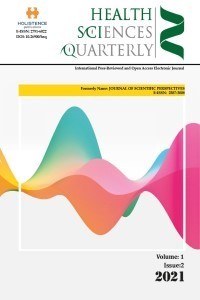Investigation of the protective effect of vitamin K1 on the heart in streptozotocin induced type 1 diabetes model
Investigation of the protective effect of vitamin K1 on the heart in streptozotocin induced type 1 diabetes model
Chick embryo, diabetes mellitus, heart streptozotocin, vitamin K1,
___
- 1. American Diabetes Association. Diagnosis and classification of diabetes mellitus. Diabetes Care. 2010;33(1):62–9. doi: 10.2337/dc10-S062.
- 2. Hanson U, Persson B. Outcomes of pregnancies complicated by type 1 insulindependent diabetes in Sweden: acute pregnancy complications, neonatal mortality and morbidity. Am J Perinatol Hanson. 1993;10(4):330–3. doi: 10.1055/s-2007-994754.
- 3. Kjos SL, Buchanan TA. Gestational diabetes mellitus. N Engl J Med. 1999;341(23):1749–56. doi: 10.1056/NEJM199912023412307.
- 4. Platt MJ, Stanisstreet M, Casson IF, Howard CV, Walkinshaw S, Pennycook S, et al. St Vincent’s Declaration 10 years on : Outcomes of diabetes. 2002;19:216–20. doi: 10.1046/j.1464 5491.2002.00665.x.
- 5. Evers IM, De Valk HW, Visser GHA. Risk of complications of pregnancy in women with type 1 diabetes: Nationwide prospective study in the Netherlands. Br Med J. 2004;328(7445):915–8. doi: 10.1136/bmj.38043.583160.EE.
- 6. Macintosh MC, Fleming KM, Bailey JA, Doyle P, Modder J, Acolet D, et al. Perinatal mortality and congenital anomalies in babies of women with type 1or type 2 diabetes in England Wales, and Northern Ireland: Population based. Br Med J. 2006;333(7560):177–82. doi: 10.1136/bmj.38856.692986.AE.
- 7. Loffredo CA, Wilson PD, Ferencz C. Maternal diabetes: An independent risk factor for major cardiovascular malformations with increased mortality of affected infants. Teratology. 2001;64(2):98–106. doi: 10.1002/tera.1051.
- 8. Wang Z, Gleichmann H. GLUT2 in pancreatic islets: Crucial target molecule in diabetes induced with multiple low doses of streptozotocin in mice. Diabetes. 1998;47:50–6. doi: 10.2337/diab.47.1.50.
- 9. Kurçer Z, Karaoğlu D. The use of alloxan and streptozotocin in experimental diabetes models (in Turkish). Turkish J Endocrinol Metab. 2012;16(2):34–40.
- 10. Bozkurt E, Atay E, Bilir A, Ertekin A, Buğra Koca H, Cem Sabaner M. A novel model of early type 1 diabetes mellitus: The chick embryo air sack model. Saudi J Biol Sci. 2021;28(10):5538–46. doi: 10.1016/j.sjbs.2021.08.074.
- 11. Zähner D, Malaisse WJ. Kinetic behaviour of liver glucokinase in diabetes. I. Alteration in streptozotocin-diabetic rats. Diabetes Res. 1990;14:101–8.
- 12. Bolzán AD, Bianchi MS. Genotoxicity of streptozotocin. Mutat Res - Rev Mutat Res. 2002;512:121–34. doi: 10.1016/S1383-5742(02)00044-3.
- 13. Bozkurt E, Atay E, Koca OH, Sabaner MC. The effect of vitamin K1 on VEGF levels in chick embryos with type 1 diabetes and diabetic retinopathy induced by streptozotocin. Med Sci Discov. 2021;8(9):551–5. doi: 10.36472/msd.v8i9.604.
- 14. Dihingia A, Ozah D, Ghosh S, Sarkar A, Baruah PK, Kalita J, et al. Vitamin K1 inversely correlates with glycemia and insulin resistance in patients with type 2 diabetes (T2D) and positively regulates SIRT1/AMPK pathway of glucose metabolism in liver of T2D mice and hepatocytes cultured in high glucose. J Nutr Biochem. 2018;52:103–14.doi: 10.1016/j.jnutbio.2017.09.022.
- 15. Sivajothi V, Dakappa SS. In vitro and in silico antidiabetic activity of pyran ester derivative isolated from Tragia cannabina. Asian Pac J Trop Biomed. 2014;4:455–9. doi: 10.12980/APJTB.4.2014C1049.
- 16. Shi L, Ko ML, Huang CCY, Park SY, Hong MP, Wu C, et al. Chicken embryos as a potential new model for early onset type 1 diabetes. J Diabetes Res. 2014;2014:1–10. doi: 10.1155/2014/354094.
- 17. Ertekin T, Bilir A, Aslan E, Koca B, Turamanlar O, Ertekin A, et al. The effect of diclofenac sodium on neural tube development in the early stage of chick embryos. Folia Morphol (Poland). 2019;78: 307–13. doi: 10.5603/FM.a2018.0080.
- 18. Rakip U, Bilir A, Arikan ES. Effect of pethidine hydrochloride on the development of neural tube: A genetic analysis study in a chick embryo model. World Neurosurg. 2021;150:613–20. doi: 10.1016/j.wneu.2021.03.065.
- 19. Wang H, Chen P, Liu XX, Zhao W, Shi L, Gu XW, et al. Prognostic impact of gastrointestinal bleeding and expression of PTEN and Ki-67 on primary gastrointestinal stromal tumors. World J Surg Oncol. 2014;2(1):1–10. doi: 10.1186/1477-7819-12-89.
- 20. Memon S, Pratten MK. Teratogenic effects of diabetic conditions in chick heart in ovo and in micromass culture may be prevented by addition of vitamin C and folic acid. Reprod Toxicol. 2013;35(1):117–24. doi: /10.1016/j.reprotox.2012.10.007.
- 21. Wang G, Liang J, Gao LR, Si ZP, Zhang XT, Liang G, et al. Baicalin administration attenuates hyperglycemia-induced malformation of cardiovascular system article. Cell Death Dis. 2018;9(2):1–17. doi: 10.1038/s41419-018-0318-2.
- 22. Mohammed OJ, Latif ML, Pratten MK. Diabetes-induced effects on cardiomyocytes in chick embryonic heart micromass and mouse embryonic D3 differentiated stem cells. Reprod Toxicol. 2017;69:242–53. doi: 10.1016/j.reprotox.2017.03.006.
- 23. Datar SP, Bhonde RR. Modeling chick to assess diabetes pathogenesis and treatment. Rev Diabet Stud. 2011;8(2):71–84. doi: 10.1900/RDS.2011.8.245.
- 24. Datar S, Bhonde RR. Shell-less chick embryo culture as an alternative in vitro model to investigate glucose-induced malformations in mammalian embryos. Rev Diabet Stud. 2005;2(4):221–7. doi: 10.1900/RDS.2005.2.221.
- 25. Bostancıeri N, Elbe H, Eşrefoğlu M, Vardı N Cardioprotective potential of melatonin, quercetin and resveratrol in an experimental model of diabetes. Biotech Histochem. 2022;97(2):152–7. doi: 10.1080/10520295.2021.1918766.
- 26. Varsha MKNS, Thiagarajan R, Manikandan R, Dhanasekaran G. Vitamin K1 alleviates streptozotocin-induced type 1 diabetes by mitigating free radical stress, as well as inhibiting NF-κB activation and INOS expression in rat pancreas. Nutr. 2015;31(1):214–22. doi: 10.1016/j.nut.2014.05.012.
- 27. Ibarrola-Jurado N, Salas-Salvadó J, Martínez-González MA, Bulló M. Dietary phylloquinone intake and risk of type 2 diabetes in elderly subjects at high risk of cardiovascular disease. Am J Clin Nutr. 2012;96(5):1113–8. doi: 10.3945/ajcn.111.033498.
- 28. Varsha MKNS, Thiagarajan R, Manikandan R, Dhanasekaran G. Hypoglycemic action of vitamin K1 protects against early-onset diabetic nephropathy in streptozotocin-induced rats. Nutr. 2015;31(10):1284–92. doi: 10.1016/j.nut.2015.05.012.
- Başlangıç: 2017
- Yayıncı: Holistence Publications
An evaluation of patients who present to the emergency department with dizziness
Oya AKPINAR ORUÇ, Neşe Nur USER
Zeynep SOFUOĞLU, Débora Pérez ROBLES, Eric DİDDEREN, Federico Rodrigo CARJAVAL, Turhan SOFUOĞLU, Aysel BAŞER, Jóhanna Noraly VEENEKLAAS
Mustafa TOSUN, Edhem ÜNVER, Ali KÜPELİ, Erdal KARAVAŞ, Sonay AYDIN
Mehmet SOYUGÜZEL, Ayşe ERTEKİN, Esra ÖZGÜL
Comparison of two different surgical techniques in the treatment of Fournier’s Gangrene
